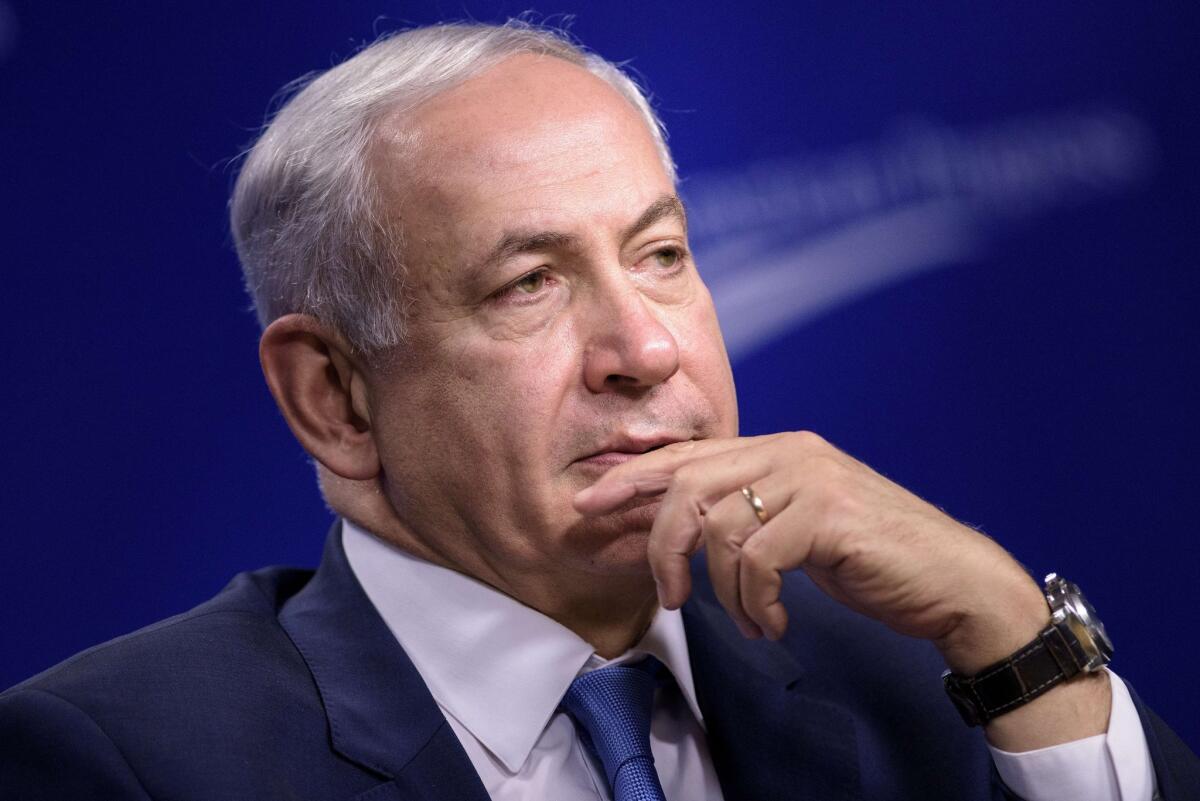‘Europe should be ashamed of itself’ for settlement decision, Netanyahu says

Israeli Prime Minister Benjamin Netanyahu said the “labeling of products of the Jewish state by the European Union brings back dark memories.”
Enraged by the European Union’s move to label imports produced in West Bank and Golan Heights settlements, Israel on Wednesday said it would suspend some diplomatic meetings with the EU scheduled for coming weeks.
The suspensions were announced by Deputy Foreign Minister Tzipi Hotovely, who appeared on Israel’s Channel 2 news. The message was conveyed by Foreign Ministry officials to Lars Faaborg-Andersen, the EU’s ambassador to Israel, who was summoned to the ministry for what was described as a reprimand over the decision, which Israel slammed as a double standard.
Earlier Wednesday, the EU approved guidelines to its member states for marking Israeli goods that are produced in the West Bank, a step that the Israeli government called discriminatory and that the Palestinian Authority praised.
An “interpretive notice” published by the European Commission outlined the need for accurate labeling of the origin of products sold in member states in keeping with European legislation.
Though stating that the move was technical and not political, the EU emphasized that in keeping with international law, it does “not recognize Israel’s sovereignty over the territories occupied by Israel since June 1967,” regardless of their legal status under Israeli law.
The notice listed these areas as including the West Bank and East Jerusalem, which Israel captured from Jordan during the 1967 Middle East War, and the Golan Heights, seized from Syria during the same conflict.
A primer accompanying the document simplifies the legal language. “The EU legislation on indication of origin is very clear: ‘Made in Israel’ used for the products coming from Israeli settlements would mislead the consumer and therefore is inconsistent with existing EU legislation.”
The EU leaves wording and enforcement up to member states, suggesting various alternatives for the different categories, including “product of Israeli settlement” where appropriate.
These goods will not be entitled to the preferential tariffs under the mutual trade agreement between the EU and Israel that will continue to apply to goods produced within Israel’s internationally recognized borders.
According to Human Rights Watch, at least $300 million worth of settlement goods — as varied as produce, boutique wines and technological products — are sold to Europe annually, although different calculations could put the value much higher. These constitute only a small portion of Israeli exports to Europe, which totaled $13 billion last year.
If the overall economic effect for Israel may be limited, the diplomatic significance is considerable. The move could be seen as an increasingly public censure of Israeli policy and a boost for boycott advocates, although EU officials declare they oppose such calls.
In a video statement, Israeli Prime Minister Benjamin Netanyahu said the “labeling of products of the Jewish state by the European Union brings back dark memories. Europe should be ashamed of itself; it took an immoral decision.”
Israel’s economy was strong enough to weather the move, Netanyahu said, but he argued that Palestinian workers at Israeli enterprises in the West Bank would be the ones to suffer.
A statement from the Foreign Ministry condemned the decision as politically motivated and discriminatory.
“The claim that this is a technical matter is cynical and baseless” said the statement, which called “puzzling and even irritating” the EU’s decision regarding Israel while ignoring other territories in dispute, even within the alliance.
“Product labeling does not advance any political process between Israel and the Palestinians,” said the ministry statement, which argued that the move would have the opposite effect.
Their Palestinian counterparts markedly disagreed.
The Palestinian Authority’s Foreign Ministry welcomed the decision as a “step in the right direction,” and called for further moves that would “serve the peace process and preserve the two-state solution.”
Abeer Odeh, the Palestinian economy minister, said her government would step up international efforts to ban entry of all settlement products to world markets.
“We welcome this decision and consider it a significant move toward a total boycott of Israeli settlements, which are built illegally on occupied Palestinian lands,” said chief Palestinian negotiator Saeb Erekat.
During his exchange with Israeli officials Wednesday evening, EU Ambassador Faaborg-Andersen reiterated that the measure was taken purely for technical reasons and that the alliance was interested in maintaining good relations with Israel, including taking steps to increase trade, according to a source in the EU delegation to Israel.
When pressed on the political issue, Faaborg-Andersen told Channel 2 on Wednesday that the EU would accept whatever borders the parties agree upon. However, he said, as long as the areas are in dispute, they cannot mark them as Israeli territory.
The EU move “does not prejudge any borders or outcome,” he said.
The volume of trade between Israel and the EU in 2014 was approximately $30 billion.
Sobelman is a special correspondent. Special correspondent Maher Abukhater in Ramallah, West Bank, contributed to this report.
ALSO
Carrying coffins, Afghans protest beheadings by militants
Palestinian goes on trial in stabbing attack on fellow 13-year-old
Pro-government forces in Syria break through siege of military base
More to Read
Start your day right
Sign up for Essential California for news, features and recommendations from the L.A. Times and beyond in your inbox six days a week.
You may occasionally receive promotional content from the Los Angeles Times.






